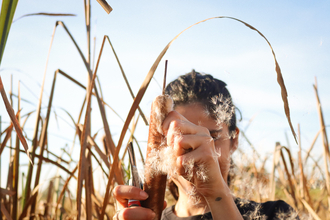In 2021 Lancashire Wildlife Trust purchased Rindle Field, a former potato field in Greater Manchester. Situated on an area of rare lowland peatland, that had been drained for conversion to agriculture, Rindle Field has become the site of our pioneering wetter farming trail, re-wetting the site to reduce harmful carbon emissions from the drained and oxidising peat, and experimenting growing different crops which will thrive in these boggy conditions.
Celery plug plants at the Rindle wetter farming trial - credit Lancashire Wildlife Trust
But along with farming with our climate in mind, we are also manging the land with nature in mind too.
Over 70 per cent of the land in the UK is farmed in some way. If this was all managed with nature-friendly farming practices in place this could provide an amazing boost for wildlife, whilst also providing us with local, sustainable food supplies.
What can farmers and other land managers do to help nature on their patch?
At Rindle Field we are starting off by looking at the field margins, those areas at the edge of the field where the crops aren’t being grown. Some of our neighbouring farmers had a glut of wheat and barley seed left over, so we have sown this all around the boundaries of the field to provide a winter seed crop.
This means that the wheat and barley will not be harvested in the traditional way, for humans, but will be left for the seed heads to ripen and seeds to fall in situ. This provides a vital food source for over wintering birds, along with creating cover and shelter for small mammals, the birds themselves, and a whole host of invertebrates.
Field pansies at Rindle Field - credit Jenny Bennion, Lancashire Wildlife Trust
Another method is to allow the native wild arable plants, often seen as weeds, to flourish on these field edges. Plants such as field pansies and redshank are already growing on site and will flourish in and around the winter wheat and barley, providing nectar for pollinators and improving biodiversity on site.
Which species will be supported?
We have already seen charms of goldfinches and chaffinches swooping around the site, along with linnets, lapwing and yellow hammers, which are all classified in the UK as Red under the Birds of Conservation Concern 4: the Red List for Birds (2021). Many of our other wintering farmland birds will also be able to benefit from both the increased food source and the shelter.
Linnet building a nest with cotton grass
Majestic raptors such as buzzards and kestrels, and maybe even an amazing hen harrier (as was recently spotted in the area), will be drawn to the site due to the preponderance of small mammals, including field voles and common shrews, that will be able to find both food and shelter amongst the winter wheat.
In summer the areas will be alive with butterflies including admirals, commas and holly blues. Other vital pollinators will include common carder bees, early bumblebees and tree bumblebees, along with lots of species of our often-overlooked solitary bees.
Common blue damselfly by Dave Steel
The re-wetted farming trial areas and irrigation ditches that serve them will also attract black darter dragonflies and more species of damselflies than you can shake a stick at, including azure, common blue, small red and large red species. Common lizards, common frogs and toads will also be able to take up home.
What next?
In the UK since 1970, 41 per cent of species are declining and 15 per cent are threatened with extinction*. Under common intensive agricultural practices, too many hedgerows are being removed and every inch of land being cultivated. We are hoping to show that by simply putting aside a tiny proportion of the land for nature that this could make a real difference to wildlife.
If all of the farms surrounding Rindle Field were to set aside margins for nature this would also provide amazing wildlife corridors, criss-crossing and connecting the area, allowing numerous species to move and adapt to a changing world.
We hope that the new Environmental Land Management Scheme will provide financial incentives and rewards for farmers and land managers that farm with nature, and our climate, in mind, and hopefully the Rindle Field pilot site will provide essential real-world data to support this.
* RSPB State of Nature report 2019, https://nbn.org.uk/stateofnature2019/
Find out more about our wetter farming trials


